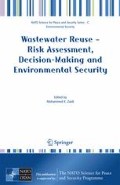Abstract
An approach is presented to model the deterioration of buried, infrequently inspected infrastructure, using scarce data. The robustness of the process is combined with the flexibility of fuzzy mathematics to arrive at a decision framework that is tractable and realistic. In applying this approach to sewerage infrastructure, the scoring scheme was converted using current guidelines. A rule-based model is used to replicate and predict the possibility of failure. The model can be used to plan the renewal of the asset subject to maximum risk tolerance. The concepts are demonstrated using data obtained from Canadian municipalities.
Access this chapter
Tax calculation will be finalised at checkout
Purchases are for personal use only
Preview
Unable to display preview. Download preview PDF.
Author information
Authors and Affiliations
Editor information
Editors and Affiliations
Rights and permissions
Copyright information
© 2007 Springer
About this paper
Cite this paper
Kleiner, Y., Rajani, B., Sadiq, R. (2007). Sewerage Infrastructure: Fuzzy Techniques to Manage Failures. In: Zaidi, M.K. (eds) Wastewater Reuse–Risk Assessment, Decision-Making and Environmental Security. NATO Science for Peace and Security Series. Springer, Dordrecht. https://doi.org/10.1007/978-1-4020-6027-4_24
Download citation
DOI: https://doi.org/10.1007/978-1-4020-6027-4_24
Publisher Name: Springer, Dordrecht
Print ISBN: 978-1-4020-6026-7
Online ISBN: 978-1-4020-6027-4
eBook Packages: Earth and Environmental ScienceEarth and Environmental Science (R0)

